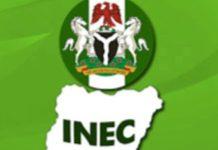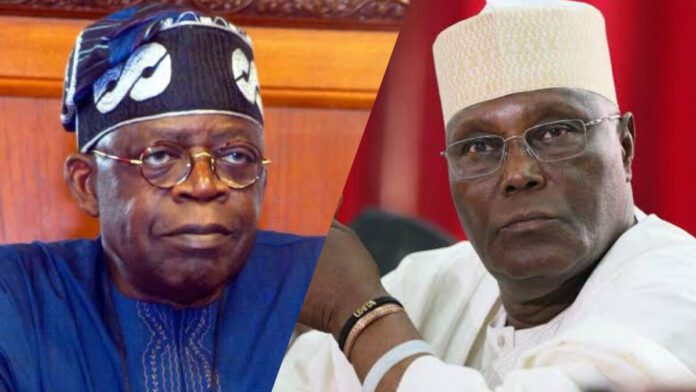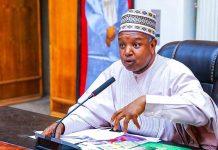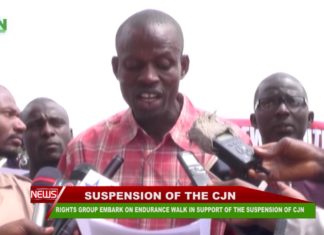PDP presidential contender for 2023, Atiku Abubakar, claimed that President Bola Tinubu’s economic policies—especially the unification of the currency rate—were hurriedly carried out without sufficient planning or stakeholder consultation.
Nigerians are presently facing economic hardships as a result of federal government policies.
For a great number of citizens, these challenges have made it impossible to afford necessities.
In a statement released on Sunday, the former vice president claimed to have knowledge that, as former President Muhammadu Buhari’s government came to an end, the nation’s economy was in serious trouble.
Tinubu came under fire from Atiku for failing to adequately outline the steps his administration was taking to alleviate the country’s chronic economic problems.
He declared: “Bola Tinubu failed, once again, to present any specific policy measures that his administration is taking to contain the crises of currency fluctuation and poverty that confront the nation at a meeting called at his request on Thursday to address the problem of foreign exchange crisis and the economic downturn, among other things.
“Instead, he told the nation and experts who have been offering suggestions on how to resolve the crisis that he and his team shouldn’t be distracted and should be given time to continue preparing their cocktail that has caused the Nigerian people great suffering.”
“The wrong policies of the Tinubu administration continue to cause untold pain and distress on the economy and the rest of us cannot keep quiet when the government has demonstrated sufficient poverty of ideas to redeem the situation,” argued Atiku, who disagreed with the administration’s policies.
He said, “There are ways that the country can walk out of the current crisis if the government will not hold on to their usual hubris.”
“I came up with a number of policy prescriptions that would rescue the country from getting into the mess that we are currently in after carefully assessing the state of our economy at the end of the previous administration. I knew full well that the economy of the country was heading for the ditch.”
The message from Atiku included a reminder that in his 2023 presidential election policy manifesto, “My Covenant With Nigerians,” he promised to restructure the foreign exchange system by doing away with several exchange rate windows that served the interests of only intermediaries, scammers, and opportunists.
The statement went on, “It would be impossible to implement a fixed exchange rate system. Firstly, it would not be consistent with our policy of maintaining an open economy that is favorable to the private sector. Second, having adequate foreign exchange reserves to protect the home currency at all times would be necessary for a fixed-exchange rate system to function successfully. But as is widely known, the main issue facing Nigeria is the ongoing foreign exchange illiquidity brought on by the nation’s small inflows of foreign currency. Naira would continue to face pressure if there are insufficient foreign exchange reserves and little faith in the Nigerian economy. Without firepower, the economy cannot sustain its currency. A fixed exchange rate arrangement is very similar to operating a subsidy regime!
However, it would be overkill to implement a floating exchange rate system given Nigeria’s fundamental economic circumstances. We would have pushed for the Central Bank of Nigeria to handle foreign exchange in a gradualist manner. It would have been better to have a managed-floating system. Put simply, under such a system, daily fluctuations in the value of the Naira would be allowed, but the CBN would intervene to maintain stability. This kind of oversight will be applied sensibly and carefully, particularly in relation to speculative activity.
According to him, Nigeria “has insufficient, unstable, and precarious foreign reserves to support a free-floating rate regime,” which makes the regulation imperative. There was not enough foreign currency in Nigeria’s reserves to be freely traded during times of crisis at fair market values. Nigeria’s falling oil production means that its earnings from the sale of crude oil are insufficient in US dollars. Additionally, Nigeria is not drawing a sizable amount of foreign investment.
“These are sufficient grounds for Nigeria to pursue a higher degree of market control, at least in the short to medium term when convergence is anticipated to be realized,” the statement continued.
“Without adequate planning or stakeholder input, Tinubu hastily put together his new FX management policy. The actual and possible negative effects of the government’s actions were either ignored or not anticipated.
“The government denied the CBN the autonomy to create and carry out a sensible FX Management Policy that would have addressed issues like raising liquidity, reducing/regulating demand, handling FX backlogs, and rate convergence.”
Join Television Nigerian Whatsapp Now
Join Television Nigerian Facebook Now
Join Television Nigerian Twitter Now
Join Television Nigerian YouTUbe Now




















![Turaki, Makinde, Bala Mohammed, others, Expel Wike’s faction out of PDP secretariat [VIDEO]](https://tvn.ng/wp-content/uploads/2025/11/1000331791-1-218x150.jpg)




